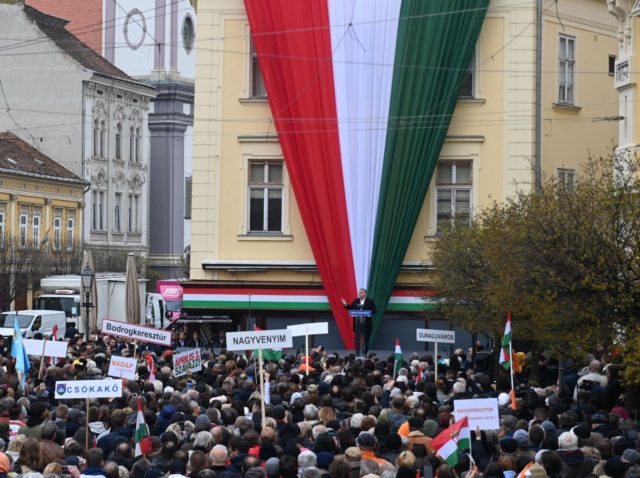Hungary’s national-conservative prime minister, Viktor Orbán, has won a fourth consecutive term of office, matching Germany’s Angela Merkel — despite the establishment left, far left, and even the far right teaming up to oust him at the ballot box.
In a victory speech to supporters of his Fidesz-KDNP party on Sunday, Prime Minister Orbán hailed their triumph over the “overwhelming force” of “the left at home, the international left all around, the Brussels bureaucrats, the [George] Soros empire with all its money, the international mainstream media, and in the end, even the Ukrainian president” as proof that “Christian democratic politics, conservative civic politics, and patriotic politics [are] not the past, [but] the future.”
“We have won a great victory – a victory so great that you can see it from the moon, certainly from Brussels,” the Hungarian quipped, in reference to the near-uniform hostility to his government’s anti-mass migration, socially conservative programme among the European Union establishment.
The international media seems to agree, with the Europe editor for the British Broadcasting Corporation (BBC), Katya Adler, noting in her coverage of the election result that “You could almost hear the collective thud of EU hearts sinking last night.”
Orbán’s reference to “the Ukrainian president” as a member of the coalition against him — which included even the Jobbik party denounced as a “neo-Nazi party” by the President of the European Jewish Congress as recently as 2015 and once a source of great concern for anti-Orbán news outlets — is an allusion to the fact that Volodymyr Zelensky intervened more or less directly in the election to accuse the Hungarian leader of “openly support[ing] Mr Putin”.
References to Orbán being a “longtime ally of Russian President Vladimir Putin” and “famed for his warm relations with Vladimir Putin” abound in mainstream media coverage of the election results even by notionally neutral outlets like the Associated Press (AP) and BBC — although the Hungarian leader has always insisted that his dealings with the Kremlin have strictly practical bases, such as keeping gas prices down and the maintenance and expansion of nuclear energy production.
Uniquely among European Union member-states bordering Ukraine, Orbán’s Hungary has refused to allow weapons shipments to cross into the embattled country through its territory, although other forms of aid are permitted.
The Hungarian opposition had been pushing for weapons shipments to be allowed, but the government resisted, warning that this could see the country dragged into the war and, moreover, could see the Ukrainian region which borders Hungary subjected to more Russian strikes — endangering its substantial ethnic Hungarian minority.
Ukraine’s treatment of its Hungarian minority has long been a source of tension between Kyiv (Kiev) and Budapest, with the latter blocking co-operation with Ukraine in NATO and EU forums prior to the Russian invasion as a result.
The Ukrainian government appeared to suggest that the Hungarian government desires that a victorious Russia will transfer sovereignty over the border region, known as Transcarpathia, to Budapest — a suggestion Orbán’s government strenuously denies.

COMMENTS
Please let us know if you're having issues with commenting.